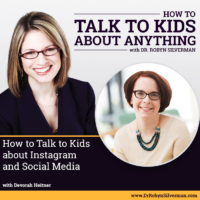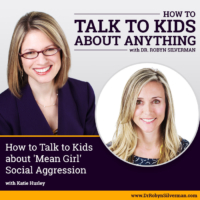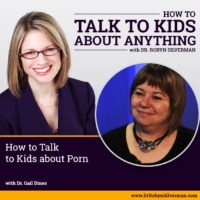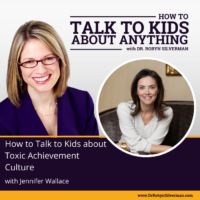Podcast: Play in new window | Download
Subscribe: Apple Podcasts | RSS | More
How to Talk to Kids about Growing up in Public
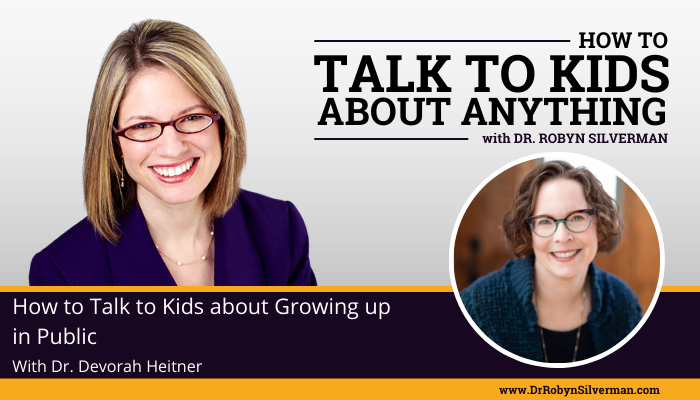
Our kids are coming of age in a digital world. We must address the elephant in the room. How can we talk to kids about growing up in public when we, as parents, are often posting about our lives and our kids while online ourselves? How can we talk the them about what to keep private, even as details about our lives are broadcast for the world to see these days? Dr. Robyn Silverman speaks with Dr. Devorah Heitner, author of Growing Up in Public.
Guest Expert: Devorah Heitner
Well folks, we are in a digital age where we track our children’s every move through apps—access their grades within minutes of the teachers posting them, send photos at a push of a button before we’ve even considered whether or not we should share or have consent to share—yikes. I was interviewed on Good Morning America about this topic because of how the number of likes affects how a tween and teen feel about their worthiness! This can lead to the creation of an online persona that teens create to attract likes even if the persona doesn’t represent who the child is at the core— how can our kids cope with zero privacy and constant judgment? Let’s bring in my friend and friend of the show, Devorah Heitner.
Bio:
DEVORAH HEITNER, Ph.D., is the authority parents turn to for empowering advice on raising resilient and kind kids in our always-connected world ” with a book: “GROWING UP IN PUBLIC: Coming of Age in a Digital World.” She has spoken at top companies and excellent schools all over the world and her writing on kids and technology has appeared in The New York Times, The Washington Post, CNN Opinion, and Fast Company, among others. Dr. Heitner earned a Ph.D. in Media/Technology and Society from Northwestern University and has taught at DePaul University and Northwestern.
Important Message:
- We need to put our commitment where our mouth is. If we’re going to ask our kids to be really discerning and thoughtful about posting online, I think we should be as well, and especially when we post about them.
- We really do need to consider our own modeling and what we’re doing.
- I think we just want to watch our own surveillance and make sure that we’re not over tracking and surveilling our kids and over relying on technology for our parenting.
- I think we should ask ourselves if it’s going to make us [using surveillance applications] more stressed or less stressed and really notice if that’s true.
- I wouldn’t just go freelance diving into your kid’s stuff with no reason. I think if you have a kid who’s struggling, who’s in a lot of pain and maybe asking for help, that’s a very different scenario than my 13 year old isn’t telling me who they sat with at lunch anymore, like they used to when they were nine or 10.
- There’s a piece of ourselves that we should allow to be open to the world, but also we each have this sacred story that should be saved for those who have proven underline circle themselves worthy.
- I think the fact that kids are able to be out about their, sexual orientation, their gender identity, their survivorship, their neurodivergence. I think that’s awesome.
- I want to be clear that I don’t think that, it’s a bad thing that kids are sharing, but I also think that what Ken Ginsburg said is so important and you want to think about who is your real friends and also can you get the kind of support that you want when you post on social versus when you talk in person.
- Once they’re in high school, it’s on my kid to get off when it’s time. I’m not going to reach out to somebody’s parents and be like, it’s time for all the kids to get off discord.
- We have to remember that [sending explicit photos] this can be part of typical sexual or exploration and growing up that can happen for teens as this part of how they’re sort of working out how they see themselves in the world and how they want to be perceived. But then you got to throw in sexism and misogyny and toxic masculinity that create a tremendous double standard great, great risks, especially for girls whose images get circulated, especially if that happens without their consent.
- We should be fighting against that double standard, making sure we tell our sons, do not ask kids for nudes and do not send nudes. Unbidden girls need that instruction too.
- I just think parents need to take a step back and understand all of the things that kids are going through. They’re trying to figure out their identities, they’re looking for body validation. They may be getting pressured to send images and we want to take a step back and think about how can I help them shore up their self-esteem so that if some random [person] either sends them a picture that they don’t want to see, they can just block them.
- We do so much prevention around sexting and we need to do some postvention because if your kid’s nude is already out there or there’s something they wrote or a video we need to make sure that they know we still respect them.
- Stay super curious. That doesn’t mean we’re spying on our kids, but we’re just very curious and interested in what are their experiences online, what are the experiences they’re having in social media spaces, on TikTok, on Discord and what do they think about it.
Notable Quotables:
- “We need to put our commitment where our mouth is. If we’re going to ask our kids to be really discerning and thoughtful about posting online, I think we should be as well, especially when we post about them.
- “We really do need to consider our own modeling and what we’re doing.”
- “Make sure that we’re not over tracking and surveilling our kids and over relying on technology for our parenting”
- “They need to be able to be in the world at a certain point without constantly being surveilled.”
- “There’s certainly going to potentially be less disclosing. And that’s just developmentally typical.”
- “There’s a piece of ourselves that we should allow to be open to the world, but also we each have this sacred story that should be saved for those who have proven themselves worthy.”
- “We have to remember that [sending explicit photos] this can be part of typical sexual or exploration and growing up that can happen for teens as this part of how they’re sort of working out how they see themselves in the world and how they want to be perceived. But then you got to throw in sexism and misogyny and toxic masculinity that create a tremendous double standard great, great risks, especially for girls whose images get circulated, especially if that happens without their consent.”
- “We should be fighting against that double standard, making sure we tell our sons, do not ask kids for nudes and do not send nudes. Unbidden girls need that instruction too.”
- “I just think parents need to take a step back and understand all of the things that kids are going through. They’re trying to figure out their identities, they’re looking for body validation. They may be getting pressured to send images and we want to take a step back and think about how can I help them shore up their self-esteem”
- “Don’t be the person who amplifies the harm.”
- “Stay super curious. That doesn’t mean we’re spying on our kids, but we’re just very curious and interested in what are their experiences online.”
Resources:
- Book: Growing Up in Public: https://devorahheitner.com/growing-up-in-public/#preorder
- Website: https://devorahheitner.com/
- Instagram: https://www.instagram.com/devorahheitnerphd/
The post How to Talk to Kids about Growing up in Public with Dr. Devorah Heitner appeared first on drrobynsilverman.com.

